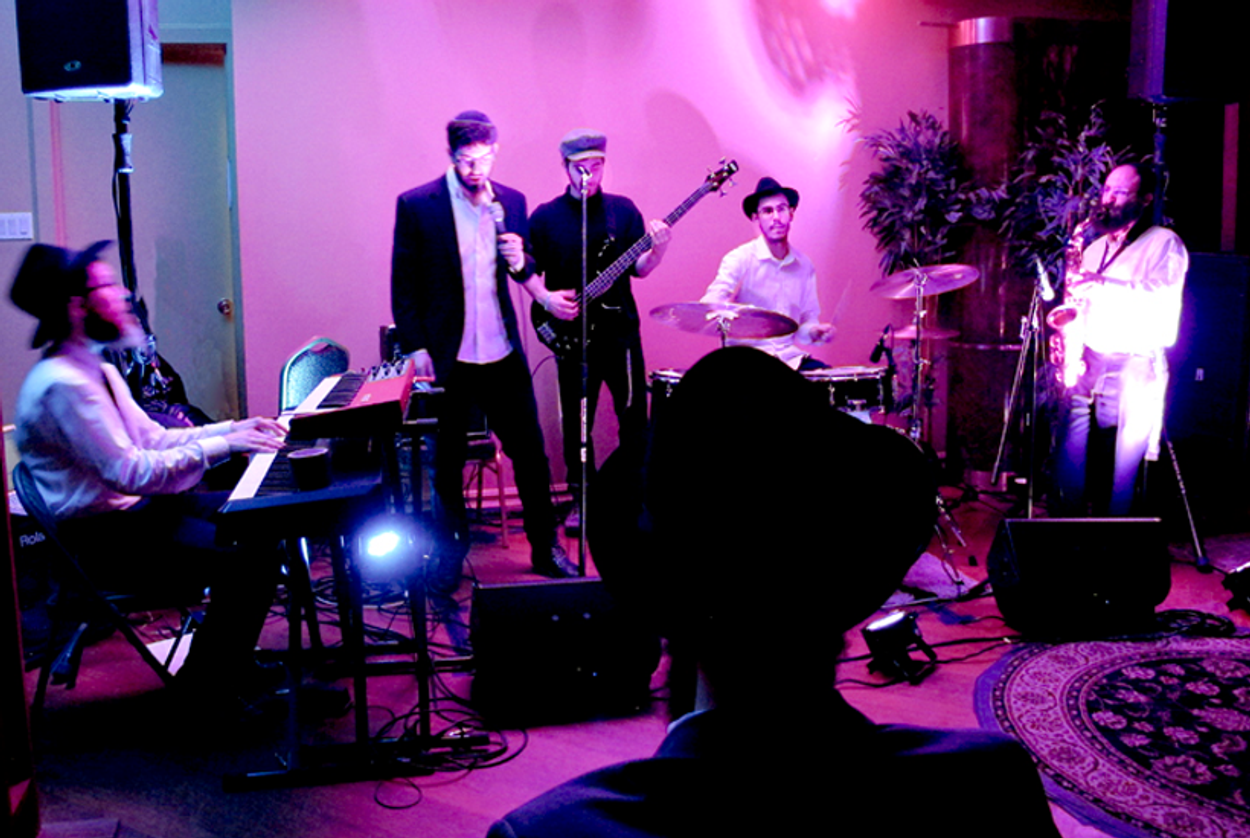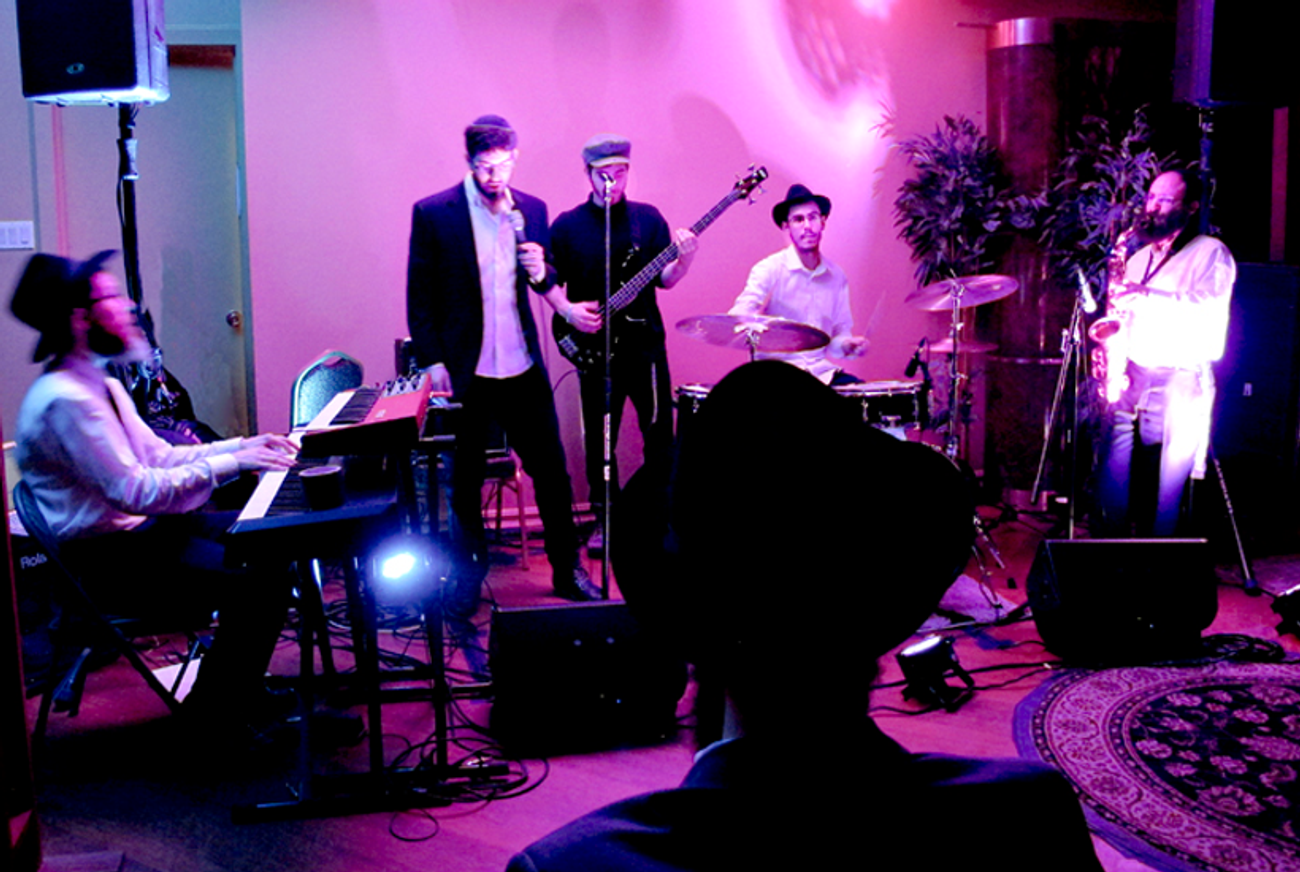For a Brief Moment This Year, Chassidic House Party Blew Their Observant Fans’ Minds
The short-lived Orthodox band made pop and funk the focus of their religious outreach—and then split up




On a recent Saturday evening, two bearded young men wearing black fedoras walked down President Street, a sleepy, tree-lined boulevard in the Crown Heights neighborhood of New York City. The area was silent, aside from the sound of a faint saxophone. The men peeled off from the sidewalk and walked along a thin, paved walkway beside one of the homes, which had a sign attached to its front window that read, PLEASE DO NOT PASS THROUGH OUR NEIGHBORHOOD WITHOUT BEING BLOWN AWAY BY CHASSIDIC HOUSE PARTY. The men continued down a steep, dark stairwell—by now the sax had become much louder and was accompanied by a keyboard, drums, and bass guitar—and blended into the basement scene, where about 40 Hasidic men sat on chairs near a picture of the late Lubavitcher Rebbe.
The five musicians appeared under a dream-like pinkish glow. Their faces grimaced with passion, except for the bass player’s, who had a sleek black electric guitar and an expression so confident you’d think he owned the place. On the opposite side of a mechitza, or partition, spanning the width of the rectangular room, a few dozen women took in the performance. This was the band’s second-ever show; its debut had taken place in this same room on Hanukkah. It would also, as fate would soon determine, be one of their last: The house party had a morning after.
During that initial show, COLlive.com, a community news service, reported at the time, “the mechitza was kosher, and the women took full advantage of the shield from prying eyes to dance like crazy.” In contrast, the men’s side had been “more of a lounge, with guys of all ages sitting and staring in awe at this band that seemed to show up in Brooklyn out of nowhere to rock their worlds.” (A less generous interpretation appeared on the website crownheights.info, where a commenter named “Oy Vey” observed that the men “looked like they were paying a shiva call or listening to a boring lecture.”)
On this night, some of the male spectators appeared spacey or disinterested, but most were engaged, bobbing heads and tapping shoes to the pop, techno, reggae, hip-hop, and funky beats. At one point, six men shot up from their seats, locked hands, and spun Hora-style around a makeshift dance floor.
“It’s a great thing that’s happening!” one of the impromptu twirlers, Crown Heights native Yaakov “JJ” Hellinger, 24, beamed afterward. Hellinger, whose tall, lanky frame contrasted sharply with a wide and bushy beard, had earlier tried to warm up the crowd with a standup comedy routine (topics had included Facebook, subway rats, and Shabbat).
“Naturally it’s a culture clash, but right here you see it blended,” Hellinger said of the band. “It’s part of our heritage, but played with an edge. The old and the new smash together and make waves.”
The blending of traditional and contemporary sounds by Hasidic musicians is nothing new. But Daniel Berry, the keyboardist and mastermind of the brief Crown Heights phenomenon that was known as Chassidic House Party, claimed that what he was doing was unique: taking nigguns—sacred Hasidic melodies composed by holy men—and fusing them with 21st-century beats, chords, and harmonies. While not the first group to make creative use of the niggun, Berry said that what made Chassidic House Party different was that nigguns appeared in each of their songs as a sort of spiritual anchor, which ensured that the “meat and potatoes of the music is coming from a Jewish place.”
Berry, 26, a former Princeton University honors student whose beard includes a prominent streak of white (the only such hint of graying facial hair in the group), was trained in classical piano while growing up secular in Los Angeles. In college he studied music and composition and joined Chabad, which led him to a yeshiva in Jerusalem after graduation. In Israel, he increasingly beganto view the “Jewish approach to life” and the “world as a musician” to be at odds. Conflicted, he would listen to traditional Jewish music for a stretch and then “binge” on bands like The Beach Boys. He also briefly covered pop songs with a local band.
Back in the United States, Berry attended the Rabbinical College of America, a Chabad-Lubavitch yeshiva in Morristown, N.J. One night he found himself jamming with a classmate, Ary BalDioceda, a drummer from Costa Rica who had studied at the Los Angeles Music Academy. The two began improvising with the nigguns that they had learned in yeshiva in the context of prayer. Over the traditional melodies, BalDioceda, 23, played funky, groove-oriented beats, and Berry made up his own chords based on his exposure to hip-hop, funk harmonies, and pop.
Berry found the experience cathartic and eye-opening. “It was the first time I had experienced in practice this unification between these two halves of myself,” Berry said, during an interview in his Crown Heights apartment. “Because you had the melody that was very ethereal, very soul-centered, and then the grooves and the harmony were very body-centered, very feel-good.”
Other musicians joined the group. Nissen Goldman, 22, a Morristown student and Johannesburg native, brought his bass. Goldman’s older brother, Choni, 30—a former backup vocalist for Matisyahu and winner of the 2012 Jewish Star competition, a worldwide American Idol-like contest held in Brooklyn—also joined the band. Known as Choni G, he had always been inspired by nigguns, which he called “deeper than any other music—the only music that is really Jewish or holy to me.” Rounding out the group was another former Morristown student, a short and passionate saxophonist named Eli Jayson, 27, who had studied composition and jazz at Western Washington University.
But even more quickly than Chassidic House Party had materialized on the Crown Heights scene, they would vanish. Berry opted to return west, to Los Angeles; Goldman would shift his focus to solo projects. Like so many bands before them, the drummer and bass player each got married and moved away.
Prior to their departure, however, the band performed at a wedding in Park Slope, and at Columbia University’s Chabad House. It also played on top of a float that rolled around Crown Heights during Purim. Berry said the group’s ultimate goal was to “go big,” which would have entailed playing at large festivals. “The grand plan is to make something earth-shattering in its scope, with multimedia and art, almost like a circus,” he said. But for now, the universe would have other plans for these men—their fans being left to wonder what might’ve been.
The poster that begins “PLEASE DO NOT PASS THROUGH OUR NEIGHBORHOOD …,” Berry explained, was meant as a parody of signs posted in Mea Shearim, the ultra-Orthodox section of Jerusalem, that warn women against dressing immodestly. “The idea for [our] poster is, to right in your face, invite you to an enjoyable night of music,” he said. “The joke is making it an expression of welcome.”
After the Saturday night show on President Street, most spectators disappeared quietly into the night, but some, like local wine store owner and Chassidic House Party super-fan Menachem Reich, lingered, eager to talk. Reich had shown up at the Hanukkah concert with low expectations, but ended up “blown away.”
“It was a massive surprise,” Reich said. “It was like, ‘Whoa, these guys make me happy!’ ”
***
Like this article? Sign up for our Daily Digest to get Tablet Magazine’s new content in your inbox each morning.
Louie Lazar is a journalist living in New York. His work has appeared in the New York Times, the Wall Street Journal, Grantland, and the Jerusalem Post.
Louie Lazar is a journalist living in New York. His work has appeared in the New York Times, the Wall Street Journal, Grantland, and the Jerusalem Post.